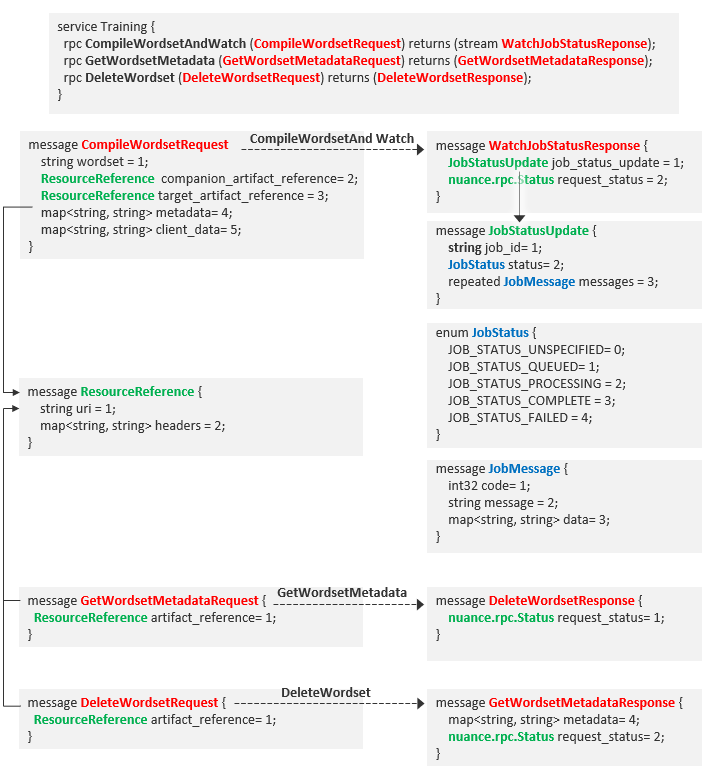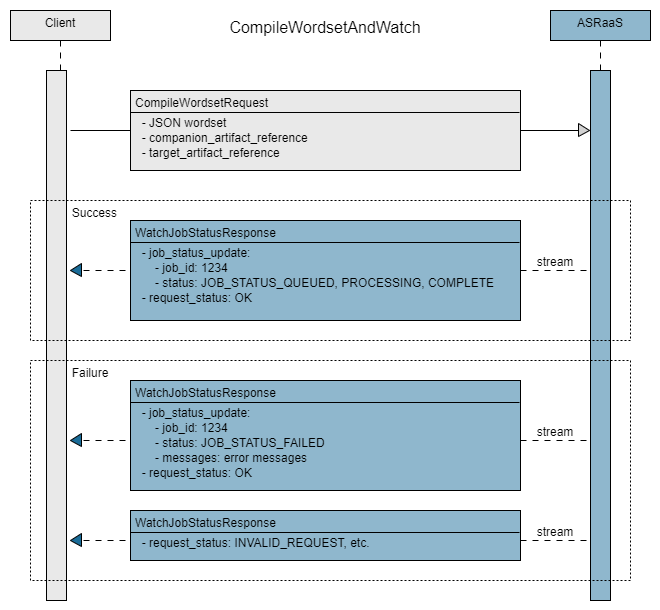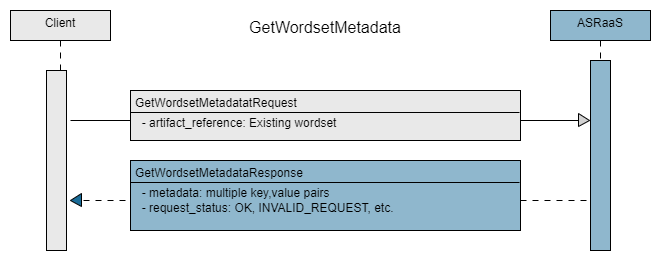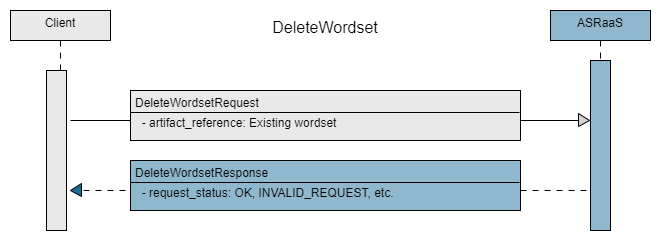Training gRPC API
The Training gRPC API contains methods for compiling wordsets.
The Training service is available to Mix users who create resources using https://mix.nuance.com and access them using the asr.api.nuance.com ASR endpoint. It is not available in other geographies.
Tip:
Try out this API using a Sample training client that you can download and run.Proto file structure
ASRaaS provides protocol buffer (.proto) files to define Nuance’s gRPC wordset training service. These files allow you to compile and manage large wordsets for use with your ASRaaS applications. See gRPC setup to download these files.
- training.proto contains the methods and messages for working with large wordsets.
- The RPC files contain status and error messages.
You may use these proto files in conjunction with the other ASRaaS proto files described in the Recognizer API.
└── nuance
├── asr
│ ├── v1
│ │ ├── recognizer.proto
│ │ ├── resource.proto
│ │ └── result.proto
│ └── v1beta1
│ └── training.proto
└── rpc (RPC message files)
The proto files define a Training service with several RPC methods for creating and managing compiled wordsets. Details about each component are referenced by name within the proto file.
For the RPC fields, see RPC gRPC messages.
Job status vs. request status
This API includes two types of status:
-
Job status: The condition of the job that is compiling the wordset. Its values are set in JobStatus and can be JOB_STATUS_QUEUED, JOB_STATUS_PROCESSING, JOB_STATUS_COMPLETE, or JOB_STATUS_FAILED.
-
Request status:The condition of the gRPC request. Its values are set in nuance.rpc.Status and can be OK, INVALID_REQUEST, NOT_FOUND, ALREADY_EXISTS, and so on.
This report on an ongoing job combines job status and request status:
2021-04-05 16:41:28,369 INFO : Received response: job_status_update {
job_id: "c21b0be0-964e-11eb-9e4a-5fb8e278d1ad"
status: JOB_STATUS_PROCESSING
}
request_status {
status_code: OK
http_trans_code: 200
}
2021-04-05 16:41:28,896 INFO : new server stream count 2
2021-04-05 16:41:28,896 INFO : Received response: job_status_update {
job_id: "c21b0be0-964e-11eb-9e4a-5fb8e278d1ad"
status: JOB_STATUS_COMPLETE
}
request_status {
status_code: OK
http_trans_code: 200
}
Training service
The Training service offers five RPC methods to compile and manage wordsets. Each method consists of a request and a response message.
| Method | Request and response | Description |
|---|---|---|
| CompileWordset AndWatch | CompileWordsetRequest WatchJobStatusResponse stream |
Submit and watch for job completion (server streaming). |
| GetWordset Metadata | GetWordsetMetadataRequest GetWordsetMetadataResponse |
Get a compiled wordset’s metadata (unary). |
| DeleteWordset | DeleteWordsetRequest DeleteWordsetResponse |
Delete the compiled wordset (unary). |
For examples of using all these methods, see Sample training client.
CompileWordsetAndWatch
This RPC method submits a request to compile a wordset and returns streaming messages from the server until the job completes. It consists of CompileWordsetRequest and WatchJobStatusResponse. The response is a server stream of job progress notifications, which stays alive until the end of the compilation job, followed by a final job status.
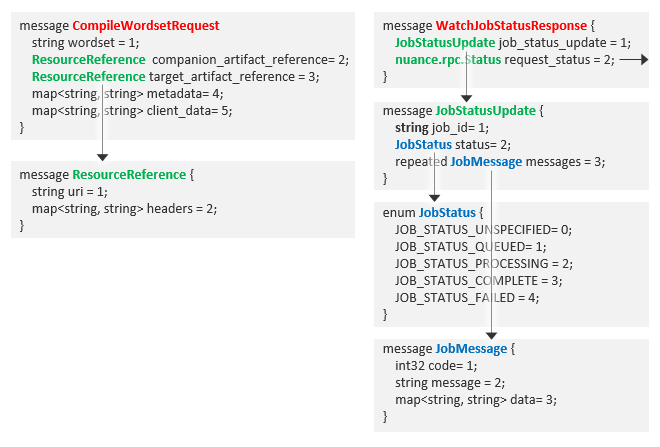
The CompileWordsetAndWatch method consists of:
CompileWordsetRequest
wordset
companion_artifact_reference (ResourceReference)
target_artifact_reference (ResourceReference)
metadata
client_data
WatchJobStatusResponse
job_status_update (JobStatusUpdate)
request_status (nuance.rpc.Status)
CompileWordsetRequest
Request to compile a wordset. The request message has a maximum size of 4 MB. See Sample training client for examples.
| Field | Type | Description |
|---|---|---|
| wordset | string | Mandatory. Inline wordset JSON resource. |
| companion_artifact_reference | ResourceReference | Mandatory. URN reference to the domain LM that the wordset extends, to use during compilation. |
| target_artifact_reference | ResourceReference | Mandatory. URN reference for the compiled wordset being generated. |
| metadata | map<string,string> | Client-supplied key,value pairs to associate with the wordset being compiled. |
| client_data | map<string,string> | Client-supplied key,value pairs to inject into the logs. |
ResourceReference
Definition of an external resource: either a domain LM containing an entity that the wordset extends, or a compiled wordset. See also Wordsets.
| Field | Type | Description |
|---|---|---|
| uri | string | Mandatory. Location of the resource as a URN reference. See below. |
| headers | map<string,string> | Optional field for internal use. |
The format of the URN reference depends on the message and resource. In these examples, the language is eng-USA.
-
DLM in companion_artifact_reference. The DLM must exist in the Mix environment under the specified context tag.
urn:nuance-mix:tag:model/context_tag/mix.asr?=language=eng-USA -
Wordset in target_artifact_reference, with an application-level wordset. The context tag is either an existing tag used for DLMs or wordsets, or a new tag that will be created. The wordset name is a new name for the compiled wordset being created:
urn:nuance-mix:tag:wordset:lang/context_tag/wordset_name/eng-USA/mix.asr -
Or a user wordset:
urn:nuance-mix:tag:wordset:lang/context_tag/wordset_name/eng-USA/mix.asr?=user_id=<user_id>
WatchJobStatusResponse
Server stream information about a compilation job in progress.
Response to CompileWordsetRequest. This response is streamed from the server, giving information about the compilation job as it progresses.
| Field | Type | Description |
|---|---|---|
| job_status_update | JobStatusUpdate | Immediate job status. |
| request_status | nuance.rpc.Status | Nuance RPC status of the request. |
WatchJobStatusResponse returns these notifications:
-
Job ID.
-
Multiple responses with JOB_STATUS_QUEUED or ~PROCESSING. The same status may be returned multiple times. Repeated notifications also keep the process alive.
-
Final job status (JOB_STATUS_COMPLETE or ~FAILED) with error messages when appropriate.
-
Final request status, either OK for successful requests, or INVALID_REQUEST and similar for others. This status refers to the request itself, not the wordset compile job that was created. See Job status vs. request status.
Invalid requests do not create a job, so the notification stream consists only of the request status.
JobStatusUpdate
Job status update to a request.
| Field | Type | Description |
|---|---|---|
| job_id | string | The job ID, a unique identifier. |
| status | JobStatus | Job status. |
| messages | JobMessage | Repeated. Error details on job. |
JobStatus
Job status as a keyword. See Job status vs. request status.
| Name | Number | Description |
|---|---|---|
| JOB_STATUS_UNKNOWN | 0 | Job status not specified or unknown. |
| JOB_STATUS_QUEUED | 1 | Job is queued. |
| JOB_STATUS_PROCESSING | 2 | Job is processing. |
| JOB_STATUS_COMPLETE | 3 | Job is complete. |
| JOB_STATUS_FAILED | 4 | Job has failed. |
JobMessage
Message about the job in progress.
| Field | Type | Description |
|---|---|---|
| code | int32 | Message code. |
| message | string | Job message. |
| data | map<string, string> | Additional key,value pairs. |
GetWordsetMetadata
This RPC method requests and returns information about a compiled wordset. This method consists of GetWordsetMetadataRequest and ~Response.

The GetWordsetMetadata method consists of:
GetWordsetMetadataRequest
artifact_reference (ResourceReference)
GetWordsetMetadataResponse
metadata
request_status (nuance.rpc.Status)
GetWordsetMetadataRequest
Request for information about a compiled wordset.
| Field | Type | Description |
|---|---|---|
| artifact_reference | ResourceReference | Mandatory. Reference to the compiled wordset artifact. |
GetWordsetMetadataResponse
Response information about a compiled wordset.
| Field | Type | Description |
|---|---|---|
| metadata | map<string,string> | Default and client-supplied key,value pairs. |
| request_status | nuance.rpc.Status | Nuance RPC status of fetching the metadata. |
GetWordsetMetadataResponse does not return the JSON content of the wordset. It provides two types of metadata:
-
Custom metadata, optionally supplied by the client as metadata in CompileWordsetRequest.
-
Default metadata (reserved keys):
x_nuance_companion_checksum_sha256: The companion DLM, SHA256 hash in hex format.
x_nuance_wordset_content_checksum_sha256: The source wordset content, SHA256 hash in hex format.
x_nuance_compiled_wordset_checksum_sha256: The compiled wordset, SHA256 hash in hex format.
x_nuance_compiled_wordset_last_update: Date and time of last update as ISO 8601 UTC date.
DeleteWordset
This RPC method removes a wordset from storage. It consists of DeleteWordsetRequest and ~Response.

The DeleteWordset method consists of:
DeleteWordsetRequest
artifact_reference (ResourceReference)
DeleteWordsetResponse
job_status_update
job_status
DeleteWordsetRequest
Request to delete a compiled wordset.
| Field | Type | Description |
|---|---|---|
| artifact_reference | ResourceReference | Mandatory. Reference to the compiled wordset artifact. |
DeleteWordsetResponse
Response to the delete request.
| Field | Type | Description |
|---|---|---|
| request_status | nuance.rpc.Status | Nuance RPC status of deleting the wordset. |
Scalar value types
The data types in the proto files are mapped to equivalent types in the generated client stub files.
Feedback
Was this page helpful?
Glad to hear it! Please tell us how we can improve.
Sorry to hear that. Please tell us how we can improve.
